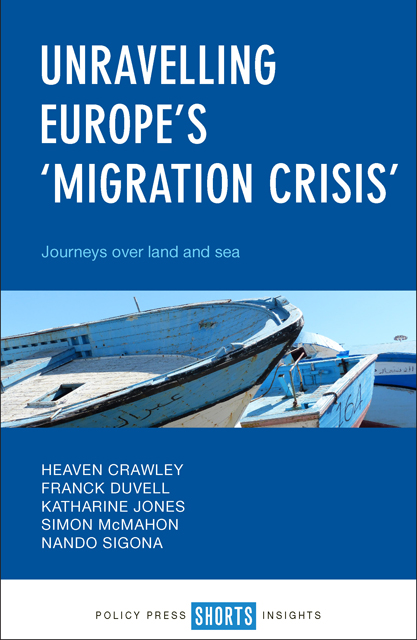Book contents
- Frontmatter
- Contents
- List of figures
- List of boxes
- Acronyms
- Notes on the authors
- Acknowledgements
- Foreword by Joanne Liu
- one The view from Europe
- two Unravelling Europe’s ‘migration crisis’
- three Not one route but many: unpacking migration to Europe
- four The decision to leave
- five Navigating borders and danger: the use of smugglers
- six Moving on
- seven Across the sea… and beyond
- eight Rethinking Europe’s response
- References
- Index
four - The decision to leave
Published online by Cambridge University Press: 21 April 2023
- Frontmatter
- Contents
- List of figures
- List of boxes
- Acronyms
- Notes on the authors
- Acknowledgements
- Foreword by Joanne Liu
- one The view from Europe
- two Unravelling Europe’s ‘migration crisis’
- three Not one route but many: unpacking migration to Europe
- four The decision to leave
- five Navigating borders and danger: the use of smugglers
- six Moving on
- seven Across the sea… and beyond
- eight Rethinking Europe’s response
- References
- Index
Summary
We don’t know who is to blame for what is happening in Syria but the Syrian people pay the price. We had our jobs, we had our businesses. Then one day we lost everything. We can find no peace in Syria. I was afraid that the regime will force my sons to join the army. (Syrian woman aged 47 travelling with her 21-year-old son)
Having unpacked the routes taken by refugees and migrants in the previous chapter, we now turn our attention to the reasons why people decided to leave their home countries, focusing in particular on the role of conflict, persecution and human rights abuse, but also unpacking the complex and often overlapping relationship between ‘forced’ and ‘economic’ drivers of migration. This is important, in part to give voice to the diverse stories of individuals and families who ended up risking their lives to cross the Mediterranean, but also because their stories challenge the assumptions underpinning Europe’s policy response (discussed further in Chapter Eight).
Conflict, persecution and human rights abuse
According to IOM (2016a), nearly 82% of those arriving in Greece and Italy in 2015 originated from just four countries: Syria, Afghanistan, Iraq and Eritrea. These are countries which were experiencing protracted political unrest and conflict and which have well-documented records of human rights abuse (EASO, 2016b; Amnesty International, 2017a; HRW, 2017). While the factors driving migration are complex and vary among those travelling to Europe via the Eastern and Central Mediterranean routes, our research confirms the conclusions of HRW (2015), IOM (2016c), and others (for example, Squire et al, 2017), that conflict, insecurity and human rights abuse in the countries neighbouring Europe – most notably the war in Syria – were the main factors driving people from their homes and towards Europe in 2015.
When we asked our respondents to describe the circumstances under which they had decided to leave, more than three-quarters (77%) of respondents across the entire sample (both Central and Eastern Mediterranean routes) explicitly mentioned factors that could be described as ‘forced migration’, including conflict, persecution, violence, death threats and human rights abuse. The figure was even higher (91%) for those interviewed in Greece, reflecting the significant proportion of people moving from situations of conflict in Syria, Iraq and Afghanistan who travelled across the Aegean from Turkey.
- Type
- Chapter
- Information
- Unravelling Europe's 'Migration Crisis'Journeys Over Land and Sea, pp. 51 - 72Publisher: Bristol University PressPrint publication year: 2017



